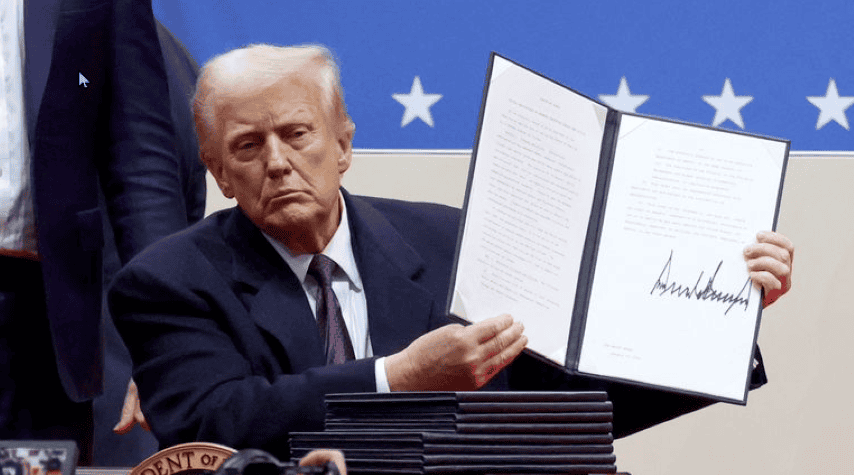On January 20, 2025, President Donald Trump signed a series of executive orders, marking the commencement of his second term. These orders address various policy areas, including immigration, energy, military policies, and social issues. The following list provides an overview of these executive actions, verified through reputable sources to ensure accuracy and authenticity.

Executive Orders Signed by President Donald Trump in 2025:
- Initial Rescissions of Harmful Executive Orders and Actions
Revokes numerous executive actions from the prior administration, particularly those related to diversity, equity, and inclusion initiatives. Source - Restoring Freedom of Speech and Ending Federal Censorship
Aims to prevent government censorship and promote free speech across federal platforms. Source - Ending the Weaponization of the Federal Government
Seeks to prevent federal agencies from being used for political purposes. Source - Putting America First in International Environmental Agreements
Withdraws the United States from the Paris Climate Agreement, citing disproportionate economic burdens. Source - Application of Protecting Americans from Foreign Adversary Controlled Applications Act to TikTok
Extends the period for TikTok to find an American buyer, allowing the app to continue operating in the U.S. during this time. Source - Declaring a National Border Emergency
Declares an emergency at the southern U.S. border, facilitating the deployment of troops and the construction of a border wall. Source - Pardoning January 6 Defendants
Issues pardons for over 1,500 individuals charged in connection with the January 6 Capitol riot and directs the Department of Justice to dismiss ongoing cases. Source - Establishing the Department of Government Efficiency (DOGE)
Creates a new department aimed at improving government efficiency, with Elon Musk appointed as its head. Source - Defending Women from Gender Ideology Extremism and Restoring Biological Truth to the Federal Government
Establishes federal policies defining sex and gender identity, recognizing only “male” and “female” based on biological distinctions. Source - Declaring a National Energy Emergency
Reverses restrictions on oil and gas exploration, promoting increased domestic energy production. Source - Ending Birthright Citizenship
Aims to end the automatic granting of citizenship to individuals born in the United States, a move expected to face legal challenges. Source - Designating Cartels and Other Organizations as Foreign Terrorist Organizations and Specially Designated Global Terrorists
Classifies certain foreign criminal organizations, including Mexican drug cartels, as terrorist groups, allowing for more aggressive legal actions against them. Source - Reinstating the ‘Remain in Mexico’ Policy
Requires asylum seekers to wait in Mexico during their U.S. immigration proceedings, reinstating a policy from President Trump’s first term. Source - Ending Federal Regulations Encouraging the Sale of Electric Vehicles
Reverses policies that promoted the manufacturing and sale of electric vehicles, aiming to reduce regulatory burdens on the automotive industry. Source - Implementing ‘Schedule F’ to Reduce Job Protections for Federal Employees
Introduces a new employment category that reduces job protections for certain federal employees, making it easier to hire and fire based on performance. Source - Moving U.S. Space Command Headquarters Back to Alabama
Relocates the U.S. Space Command headquarters from Colorado back to Alabama, reversing a previous decision. Source - Withdrawing from the World Health Organization (WHO)
Initiates the process of withdrawing the United States from the WHO, citing concerns over the organization’s handling of global health issues. Source - Restoring Names That Honor American Greatness
Renames the Gulf of Mexico to the Gulf of America and reverts Denali to its pre-2015 name, Mount McKinley. Source - Re-adding Cuba to the State Sponsors of Terrorism List
Reclassifies Cuba as a state sponsor of terrorism, reinstating sanctions and travel restrictions. Source - Removing Sanctions on Israeli Settlements in the West Bank
Lifts sanctions on Israeli settlements in the West Bank, signaling a shift in U.S. foreign policy in the region. Source - Reversing the Family Reunification Task Force
Dissolves the task force established to reunify families separated at the southern border, redirecting resources to other immigration enforcement priorities. Source - Establishing the External Revenue Service
Creates a new agency tasked with imposing tariffs on goods from countries like Canada, Mexico, and China, aiming to encourage domestic production and reduce trade deficits. Source
Closing Thoughts
The media’s response to these executive orders has been polarized, reflecting the nation’s deep divisions. Conservative outlets have lauded the swift actions as a fulfillment of campaign promises, emphasizing a return to traditional values and national security. In contrast, liberal media have criticized the orders, particularly those affecting immigration and LGBTQ+ rights, viewing them as regressive and discriminatory. This dichotomy in media coverage underscores the ongoing debates surrounding these policies and their implications for American society. Source
Read more at The Best All Round




